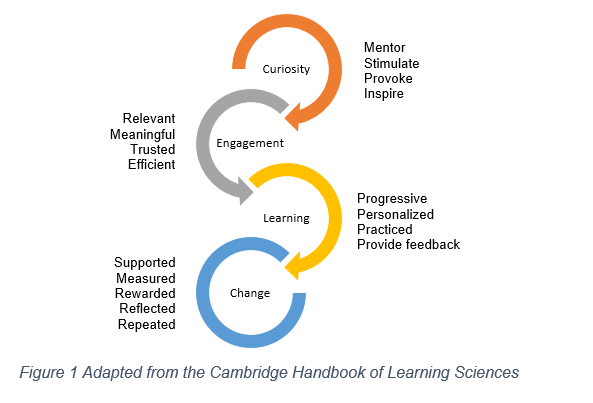It’s been a month since we all met at the Alliance Annual Conference. I was proud, our purpose became clearer, and the attendees’ feedback and interactions endorsed it!
Reflecting on the event, I am grateful to be a part of the community and now have the honor of leading the Alliance as its President. During my tenure, I want to stay closely connected with all of you, and I hope to do it by sharing my perspectives and understanding yours about a topic that I am very passionate about — learning.
Join me through the Almanac and upcoming podcasts as we dig deeper into learning. Please send me your comments, thoughts and perspectives as we begin to discuss the topic that is near and dear to all of us and core to what we all do by emailing acehp@acehp.org (please put Learning Matters in the Subject Line).
John Dewey, one of my favorite education reformers said, “Education is life itself.” It is so true, isn’t it? There is a lot to it!! While education is this overarching journey (we all want to master a discipline and succeed in it), learning is every interaction we engage in or are involved in that helps us succeed and attain mastery. These interactions are crucial, and the way they are designed, developed and presented have a lasting impact on how one perceives, makes meaning and applies it. This is integral to what we all do every day. We worry about how to create the interactions that will facilitate learning and produce change in behaviors of clinicians leading to quality outcomes.
The new discipline of the learning sciences today provides insights and perspectives into learning. The learning science foundations are multi-disciplinary and pull from the several fields of study in education:
- Constructivism: How knowledge is constructed
- Cognitive sciences: How knowledge is processed to enable connections that promote understanding and meaning
- Learning technologies: Tools and technology platforms that can enable and support learning to happen
- Socio-cultural studies: Provides insights into behaviors and provide ways to leverage human social needs and behaviors to promote learning
- Disciplinary knowledge: Factors that contribute to the development of expertise
In the early 1980s, researchers confirmed that knowledge constructed by adults is both quantitatively and qualitatively different from children — the so-called knowledge structures of mental schemas are different. In adults, this is influenced or shaped by prior knowledge, experience, beliefs, norms and opinions that each of us possess. This is the fundamental premise of the cognitive sciences — that knowledge representations in the mind are based on concepts, beliefs, experiences, facts, procedures and models. Artificial intelligence (AI) that can describe and inform expert behaviors have shed more light into development of expertise and related knowledge structures. AI defines expertise as accumulation of a large number and complex knowledge representations, procedures and plans, ability to manipulate such plans and procedures to address situational needs and challenges, and to reflect on one’s own cognitive processes as they occur. Such deep learning leads to intelligent performance — what every learning environment should facilitate.
Thus, repeated exposure to situations that require application of knowledge and skills, reflection, ability to problem solve, and facilitation of higher order thinking skills are key to development of expertise.
Another key element is meaningful interactivity. Adults learn by relating new learning to past experiences, by linking learning to specific needs and by practically applying learning, resulting in more effective and efficient learning experiences. Greater interactivity and engagement promote learners’ efficiency, motivation and cognitive effectiveness.
Learning is a deeply personal experience: We learn because we want to learn. By enabling learners to be more active participants, a well-designed experience can motivate them to become more engaged with the content. Interactive learning shifts the focus from a passive, teacher-centered model to one that is active and learner-centered, offering a stronger learning stimulus. Interactivity helps to maintain the learner’s interest and provides a means for individual practice and reinforcement.
How do we integrate all of these in the process of learning? The learning sciences propose four different approaches to make this happen.

Here are some examples of tactics for the different approaches
- Invoke curiosity: Self assessment, formative and summative assessments, coaching, mentoring, challenging assignments and scenarios, inspirational experiences that are thought provoking
- Meaningful engagements: Interactivity that is relevant, appropriate to the learning levels of the audience, applicable to daily practice, delivered in a safe learning environment through a trusted source. Also, easy-to-follow delivery of activities, interactions and content that allows for learner interactions and creates opportunities for dialogue and discussions.
- Learning experiences: Experiences that are sequential, involve scaffolding, are personalized and aligned with learner needs, allow for repeated practice, feedback, coaching and reflection. The experiences build upon each other into a progressive curriculum and are not just one-off experiences.
- Creating behavior change: Recognition, support, and tools and resources set the learner up for success. Continuous learning opportunities to reflect upon and assess the change are crucial for retention of the changed behavior over time.
Intelligent performance, however, requires deep knowledge. Food for thought! How can we help learners acquire deep knowledge? This requires them to relate new concepts and ideas to prior knowledge, look for patterns and underlying principles, integrate knowledge into relevant interrelated scenarios, evaluate new ideas and their outcomes, understand the process of dialogue and argument, and reflect on their own process of learning and understanding. How do we promote such intelligence performance?
I’m curious to know your answers. Reach out to acehp@acehp.org and share your ideas and thoughts!
And, it does matter! All of our perspectives, reflections, interpretations and applications of what we understand and know about how people learn. I invite you to learn together, engage with the community, enhance your knowledge and experience the comraderies as the Alliance moves into the new decade and implements plan for you, its members.